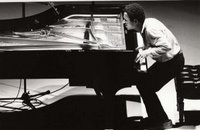|
American Quartet European Quartet Standards Trio Solo Piano, Etc. Whenever I’m rattling off my favorite pianists, Keith Jarrett often gets an “oh yeah” at the end of the line. He is a masterful player, yet he transcends the instrument and goes right to the source. I used to be skeptical of the adage that “music plays the musician” instead of the other way around, or that the musician is really just a vessel, but Jarrett helped me understand the idea. Like Bird or Hendrix, Jarrett had a strong current running though him from the start; his job was to be technically ready and mentally willing to transmit that energy. He devoted his life to it and found more than one avenue for it to flow through. So of course he’s an incredible pianist, in terms of technique, but whenever somebody says his name, the music comes to mind first. Jazzwise, the two separate quartets Jarrett led during the 1970s make him one of the brightest lights of that decade, in my view, and probably the best overall writer - I think his tunes are severely underrated. On the side, he also wrote a few classical and gray area works. In the 1980s, the jazz writing suddenly stopped and Jarrett initiated the standards trio with Gary Peacock and Jack DeJohnette. At present, Jarrett’s jazz work has almost exclusively been with that one trio; having paid his dues as a younger player, I guess he got to the point where there was no need to futz around with different bands just for the sake of experience. I do love that trio and consider them one of jazz’s greatest groups, but it’s always puzzled me that Jarrett could create such original music throughout the ‘70s and then completely stop writing. (Although that clues us in to his process, in that it isn’t all about the material.) On top of the jazz groups, he’s also spent periods throughout his career giving fully improvised solo piano concerts. Clearly, Jarrett “gets it,” whatever the it of improvisation is. Considering his compositions as well, I don’t hesitate to say he’s one of the best musicians to emerge in the twentieth century. He’s been a controversial one, too. Not just for the pronouncements on modern jazz, especially the young lions movement and its figurehead in particular, but for the explanations of his own work processes. Music - where it comes from, how the musician conducts it - is ultimately mysterious, despite some very articulate attempts on the part of certain practitioners throughout history to explain what they do. Jarrett has been one of those who are aware of their personal process and has tried to explain it, directly and indirectly, in liner notes, interviews, etc. For this, he has been bashed (as pseudo-intellectual, whatever) by those critics who have no truck with self-conscious artists. And Jarrett’s attempts to secure ideal performance conditions - like complaining about intrusive lights, bad pianos, stages that aren’t level, and so forth - have also gotten him a small rep as a crybaby. These are all mountains from molehills, if you ask me, but then I agree with where he’s coming from on the jazz and performance issues.
Then there’s the “singing along” at the piano, apparently an unavoidable part of how Jarrett plays. I find it objectionable at worst, yet it doesn’t happen as often as people make out. I’ve only found three of his records where it actively distracts me from the music. And strangely enough, you won’t hear it much at all in the solo concerts. In the uptempo jazz, it occurs fairly often. A lot of pianists sing along with or vocally acknowledge what they’re playing - Hancock and Monk come to mind - but if you’ve ever seen Jarrett play, he’s up and writhing at the keyboard, bringing his vocals much closer to the microphones than other sit-down pianists. How’s this for fair warning in these reviews: if I think his vocalizations on any particular title are distracting, I’ll say so. Otherwise, assume they aren’t there (as with most of the solo concerts) or that they’re relatively harmless.
|
